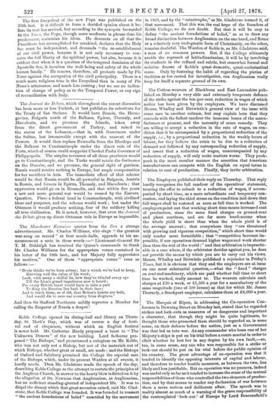Keble College opened its dining-hall and library on Thurs- day,
St. Mark's Day, which was of course a day of festi- val and of eloquence, without which an English festival is never held. Mr. Gathorne Hardy proposed a toast to " The Unknown Donors" of the new building. Lord Selborne pro- posed " The Bishops," and pronounced a eulogium on Mr. Keble, who was not only not a Bishop, but not of the materials out of which Bishops, whether great or small, are made ; and the Bishops of Oxford and Salisbury promised the College the especial care of the Bishops, which, under its present Warden at all events, it hardly needs. Then Mr. Gladstone made the speech of the day, describing Keble College as the attempt to restate the principles of the Anglican Church, in answer to the heavy blow inflicted on it by the allegation of Dr. Newman that Anglicanism, as Anglicanism, has no sufficient standing-ground of independent life. It was to dispel the dismay which that great secession raised, said Mr. Glad- stone, that Keble College was founded. It was founded to reassert " the ancient foundations of belief " unsettled by the movement in 1833, and by the " catastrophe," as Mr. Gladstone termed it, of that movement. That this was the real hope of the founders of Keble College, we do not doubt. But that it will be easy to define " the ancient foundations of belief," so as to draw any broad distinction between Anglicanism on the one band, and Rome or a relatively very undogmatic form of Christianity, on the other, remains doubtful. The Warden of Keble is, as Mr. Gladstone said, a man of no common powers. But, if the College ultimately avoids the reproach of latitudinarianism, it will be by involving its students in the refined and subtle, but somewhat formal and sedative finesse of Keble's quasi-domestic, quasi-ecclesiastical muse. Only by fostering the habit of regarding the pieties of tradition as too sacred for investigation, can Anglicanism really keep for itself a separate ground of its own.


































 Previous page
Previous page